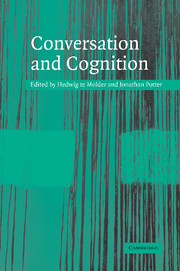1 - Talking cognition: mapping and making the terrain
Published online by Cambridge University Press: 22 September 2009
Summary
Overview
This book addresses issues of conversation and cognition. For the first time some of the world's experts on interaction analysis have been brought together to consider the nature and role of cognition. They address the question of what part, if any, cognitive entities should play in the analysis of interaction. They develop different answers. Some are consistent with current thinking in cognitive psychology and cognitive science; others are more critical, questioning the idea that cognition is the obvious and necessary start point for the study of human action.
The question of the relation of language and thought has been a central one in cognitive and developmental psychology for more than thirty years. For the contributors here the focus is not on language as it is traditionally understood but rather on talk or, even more specifically, on talk-in-interaction. That is, not on language as an abstract set of words, meanings, or a system of contrasts as it has usually been conceived, but talk as a practical, social activity, located in settings, occurring between people, used in practices. This approach has significant implications for the way traditional issues of cognition are treated. Talk and cognition have been brought together only rarely in the past and often for particular purposes local to one discipline. However, there are some important precursors to the current enterprise, and we will describe them in detail below.
Information
- Type
- Chapter
- Information
- Conversation and Cognition , pp. 1 - 54Publisher: Cambridge University PressPrint publication year: 2005
Accessibility standard: Unknown
Why this information is here
This section outlines the accessibility features of this content - including support for screen readers, full keyboard navigation and high-contrast display options. This may not be relevant for you.Accessibility Information
- 28
- Cited by
